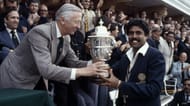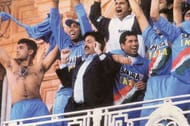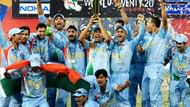
India is a powerhouse in the world of cricket. BCCI is the richest cricket board in the world. IPL, the most lucrative cricket league in the world, is run by the BCCI and India houses some of the best facilities in world cricket right now.
However, all of this didn't happen in a single day. It was a rather slow process. Indian cricket had a humble beginning.
India were not considered to be a big player for a long time on the world stage. Fast forward to 2020, and a lot has changed. It's been an eventful journey replete with many significant milestones that have paved the way for Indian cricket to be identified and respected like it is today.
On that note, let us have a look at five specific moments that changed Indian cricket forever.
Indian cricket's five epochal moments
#1 India win an away Test series against West Indies in 1971

West Indies were in a league of their own if you talk about cricket in the 70s and 80s. The level of cricket that they displayed was unmatched, and the result used to be considered a foregone conclusion whenever they played. It was against this team that a diminutive player from India made his debut and put the world on notice with a string of impressive performances.
Sunil Gavaskar made his debut in the 1971 away Test series against the West Indies and put together 774 runs in the four-match series that left the home team shellshocked. India won the series 1-0 in what marked a historic achievement.
It was India's first series win in the West Indies. Winning on foreign soil was considered an achievement at that point of time (just like it is today). But doing so against the best side in the world in the latter's backyard gave the Indian team the confidence that it could stand toe to toe with anyone in the world.
To prove that this was not a fluke, the Indian team went on to win their away series in England. The turn of events in 1971 changed the perception of the world about the Indian cricket team and India started getting treated as a force to be reckoned with.
#2 India win the 1983 World Cup

The 1983 World Cup was a shocking turn of events in many ways. It won't be too much of an exaggeration to suggest that there was hardly anyone that fancied India to reach the World Cup final, let alone win it. India weren't considered one of the top ODI teams then. Their performances in the last two World Cups were nothing to write home about either.
So when a young team led by a young and ambitious captain Kapil Dev took on the two-time winners West Indies in the Lord's final, there was only one result any cricketing expert at that time could have fathomed. West Indies were the best team in the world at that time and were the firm favourites to win a hat-trick of World Cup titles. But what happened that day at Lord's changed how cricket wasperceived in India.
India shocked the world by beating the West Indies and in the process stamped their name in history. Back home, it led to a paradigm shift where cricket became a religion and started uniting people across different spheres of society. The sense of belonging that the World Cup victory brought to the country put cricket at a pedestal in India and gave it the cult following that is still going strong.
#3 India win the Natwest Trophy against England, 2002

India had gained the respect of the world by the time we rolled into the 21st century. With players like Sachin Tendulkar, Sourav Ganguly and Rahul Dravid, the team commanded respect. However, the team always had a demure image on the field. Indian cricketers weren't considered to be aggressive or confrontational, and sometimes were labelled too respectful towards lesser opponents.
All of this changed, though, when Sourav Ganguly took over the reins of the team. India became more aggressive and played with a purpose.
Before the Natwest Trophy final in 2002, India had dominated the tri-series. But a recent dismal run of losing finals gave the team a slightly unfair image of chocking. Moreover, the Indian cricket team was seen as one too reliant on Tendulkar, Ganguly and Dravid.
In the final against England, India were asked to chase down 326 runs for a win. A target of that magnitude in those days was almost considered almost impossible, and the loss of Tendulkar, Ganguly and Dravid only exacerbated the situation.
That was when two young stars in Yuvraj Singh and Mohammed Kaif took centre-stage and guided the team to an improbable run chase. What followed next was an iconic moment of Sourav Ganguly taking off his shirt and waving it in the balcony of the Lord's dressing room. This was the new India, a brash, outspoken, in your face unit that wasn't afraid to speak their mind.
#4 India win the inaugural T20 World Cup, 2007

T20 cricket received a lukewarm reception from the purists. So much so that the Indian team management had not even warmed up to the idea of playing the format regularly. The inaugural T20 World Cup took place in 2007, and the Indian team sent for the tournament had a cumulative T20I experience of only one match at that time.
To make matters worse, most of the 'superstars' of the team in Sachin Tendulkar, Rahul Dravid and Sourav Ganguly were not in the team. India had a new young captain in MS Dhoni and a very young and inexperienced team. They had some great match-winners in Virender Sehwag, Dhoni and Yuvraj Singh but not much was expected of the team when they went to play their first game in the tournament.
A surprise victory against Pakistan in a bowl-out was followed by a win over South Africa and one against England where Yuvraj Singh smashed Stuart Broad for six sixes in an over. Then came the win over Australia in the semis and another thrilling win over Pakistan in the final.
It was a fairy tale run no one saw coming. The direction of Indian cricket changed after India won the World Cup. It led to the birth of IPL, one of the most lucrative T20 leagues in the world. Perhaps, more importantly, it gave India its next captain in Mahendra Singh Dhoni who would go on to take Indian cricket to even bigger heights.
#5 India win the 50-Over World Cup, 2011

There was something surreal about the 2011 World Cup. It was, by all means, going to be the last World Cup for Sachin Tendulkar. The quadrennial tournament was in India, and the hosts were one of the favourites for the title. When you look back, it almost seems as if everyone knew that it was going Tendulkar's last shot at winning the only major title missing in his illustrious trophy cabinet.
Sachin Tendulkar played like the Sachin Tendulkar of the 90s and was arguably the best batsman in the team. The fact that the little master could turn back the clock proved what a gem he was for Indian Cricket. You had players like Gautam Gambhir and Suresh Raina chipping in when the team was in a spot of bother and then you had Yuvraj Singh putting together a Man of the Tournament performance while battling a disease like cancer.
India were the favourites to win the World Cup. But it was something that hadn't happened in 28 years. When the moment finally arrived, and Dhoni smashed that winning six, it put India on top of the world. They were now the best team in the world, and it wasn't a fluke. It was the result of years of hard work and some of the legends of the game putting their hands up when they needed to.
The win stamped Indian cricket's indelible mark on the world cricket scene, something that has continued under present captain Virat Kohli.
Follow IPL Auction 2025 Live Updates, News & Biddings at Sportskeeda. Get the fastest updates on Mega-Auction and cricket news
